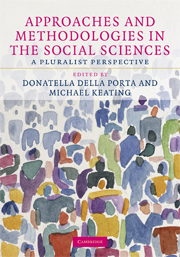Book contents
- Frontmatter
- Contents
- List of figures
- List of tables
- Contributors
- Preface
- 1 Introduction
- Part I Epistemology and philosophy of the social sciences
- Part II Research design
- 10 Concepts and concept formation
- 11 Comparative analysis: case-oriented versus variable-oriented research
- 12 Case studies and process tracing: theories and practices
- 13 Quantitative analysis
- 14 The design of social and political research
- 15 Ethnographic approaches
- 16 Comparing approaches, methodologies and methods. Some concluding remarks
- References
- Glossary
- Index
16 - Comparing approaches, methodologies and methods. Some concluding remarks
Published online by Cambridge University Press: 05 June 2012
- Frontmatter
- Contents
- List of figures
- List of tables
- Contributors
- Preface
- 1 Introduction
- Part I Epistemology and philosophy of the social sciences
- Part II Research design
- 10 Concepts and concept formation
- 11 Comparative analysis: case-oriented versus variable-oriented research
- 12 Case studies and process tracing: theories and practices
- 13 Quantitative analysis
- 14 The design of social and political research
- 15 Ethnographic approaches
- 16 Comparing approaches, methodologies and methods. Some concluding remarks
- References
- Glossary
- Index
Summary
Surveying the differences in approaches
As mentioned in the Introduction, this volume is a plea against the construction of impenetrable barriers be tween approaches. We believe that social science knowledge is a collective enterprise, built using various techniques, methodologies and methods.
Social science research is made from different tasks and different moments – from the selection of a problem for analysis, through the development of proper theories and concepts, to the choice of cases and units of analysis, data collection and data analysis. Although each research project has to give serious consideration to each of these tasks, single pieces of research usually privilege some of them. Some are more oriented towards the development of new concepts; some explicitly aim at theorization; some are field-oriented, producing new data; some use sophisticated techniques for data analysis; and some are geared to normative questions.
Even very good pieces of research are usually remembered because they gave a particularly original contribution to one (or a couple) of these tasks. Some contributions are often cited because of the systematization of new concepts (for example, Charles Tilly's concept of a repertoire of collective action), others because they put forward a new theory about a macro-phenomenon (such as Barrington Moore Jr's work on the origins of democracy). Some pieces of research are considered as particularly valuable because of the collection of new databases (for example in values surveys or electoral studies), while others use existing databases but aim at developing new instruments of data analysis.
Information
- Type
- Chapter
- Information
- Approaches and Methodologies in the Social SciencesA Pluralist Perspective, pp. 316 - 322Publisher: Cambridge University PressPrint publication year: 2008
Accessibility standard: Unknown
Why this information is here
This section outlines the accessibility features of this content - including support for screen readers, full keyboard navigation and high-contrast display options. This may not be relevant for you.Accessibility Information
- 6
- Cited by
